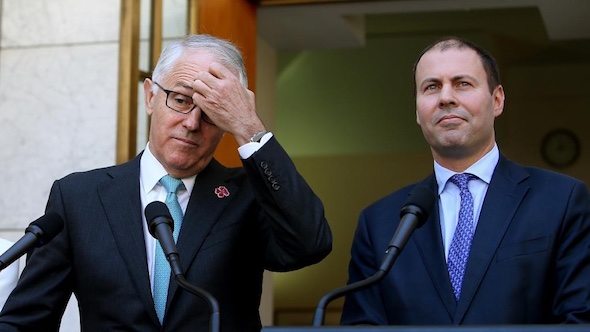The Coalition government has made no concessions on the emissions component of its proposed National Energy Guarantee, risking a stalemate with Labor states despite major improvements in the NEG’s technical design.
A Commonwealth paper circulated to energy ministers late last week reveals that the Coalition government – under pressure from its significant coal-supporting, climate science-denying conservative rump – has not budged on emissions.
The 11-page paper repeats the government’s long-standing position: Namely, a 26 per cent emissions reduction target for the electricity sector by 2030, that state schemes will not add to its target, emissions exposed industries will be excluded, and offsets may still be allowed.
“Where States and Territories pursued their own renewable energy targets, such as to achieve investment or employment policy objectives, this would not change the target under the Guarantee,” the paper says.
This will likely make the NEG difficult to accept for states and territories like Victoria, the ACT and Queensland, who have put in place ambitious renewable energy targets that imply much more significant emissions reductions.
It also puts states such as New South Wales in a curious position, because it means there will be no drivers at all for renewable energy investment in its own state, apart from the likely phased closure of large coal-fired generators such as Liddell (2022), Vales Point (2028) and Eraring (2032).
As we reported in February – Coalition seeks to lock in weak targets in NEG – and last week – Frydenberg says it’s a weak NEG or nothing – the government will hold position not just on a weak emissions target, but on locking it in for as long as possible. This paper confirms that.
It will start with a 10-year target (out to 2030) that can only be reviewed every five years (unlike the reliability component which will be reviewed each year), and cites support from the big energy utility and business groups for this position.
Indeed, the Commonwealth paper relies heavily on quoted support from the main business lobby groups, corporates such as BHP, and the big three energy retailers and manufacturers.
Other organisations barely get a look in, and neither do views that don’t accord with the government’s own ideology.
Of particular note are the weak emissions targets and the observations such as Origin Energy’s that Australia can and should be doing a lot better on emissions, a view shared by nearly all submissions apart from those with strong vested interests. But it was ignored.
Analysts say the 26 per cent reduction is ridiculously low for an electricity sector – both in the context of the Paris climate agreement, and because the sector offers the cheapest and easiest emissions reduction in the country, and this will merely shift the burden elsewhere.
It will be even weaker if offsets are allowed into the scheme, as this means that the big utilities can buy cheap international offsets to meet the weak emissions scheme, so avoiding investment in renewables in Australia. Needless to say, most of the big retailers support this.
The technical paper circulated last week – as reported by RenewEconomy – shows significant movement in the technical design of the scheme.
One of the big shifts was the decision to abandon the idea of physical contracting, and replace it with financial contracts already common in the electricity market.
This is seen as an important step to avoid further concentration, and further price hikes, in a market largely controlled by the dominant big three retailers and the government-owned Snowy Hydro.
Other major shifts occurred in the reliability mechanism, and it appears that this will only be a “light touch” mechanism that will only be triggered when a potential shortfall is not met by the market three years out from occurring.
This will likely prompt investment in cost-effective and modular investments in dispatchable power, favouring demand management and other demand-side initiatives, as well as battery storage, because of the speed and easy scaling of their deployment.
Those initiatives now risk being lost in the debate over the emissions targets, as many analysts have noted that locking in the Coalition targets will actually be worse than not having a policy, and could cause investment in new generation to dry up.
But the Coalition government is unable to move because of the vocal right-wing rump, led by former prime minister Tony Abbott, former deputy prime minister Barnaby Joyce, and backbench energy committee chair Craig Kelly, along with a group of disaffected former ministers.
It says in its paper that it will undertake detailed work to further assess and develop the approaches discussed in this paper before making final decisions.
“This includes work on: how the target is expressed and the process for reviewing and adjusting it within the emissions mechanism, how any EITE exemption is calculated and implemented, and further consideration of the eligibility of offsets, and the frameworks that could apply if they were to be used.”











